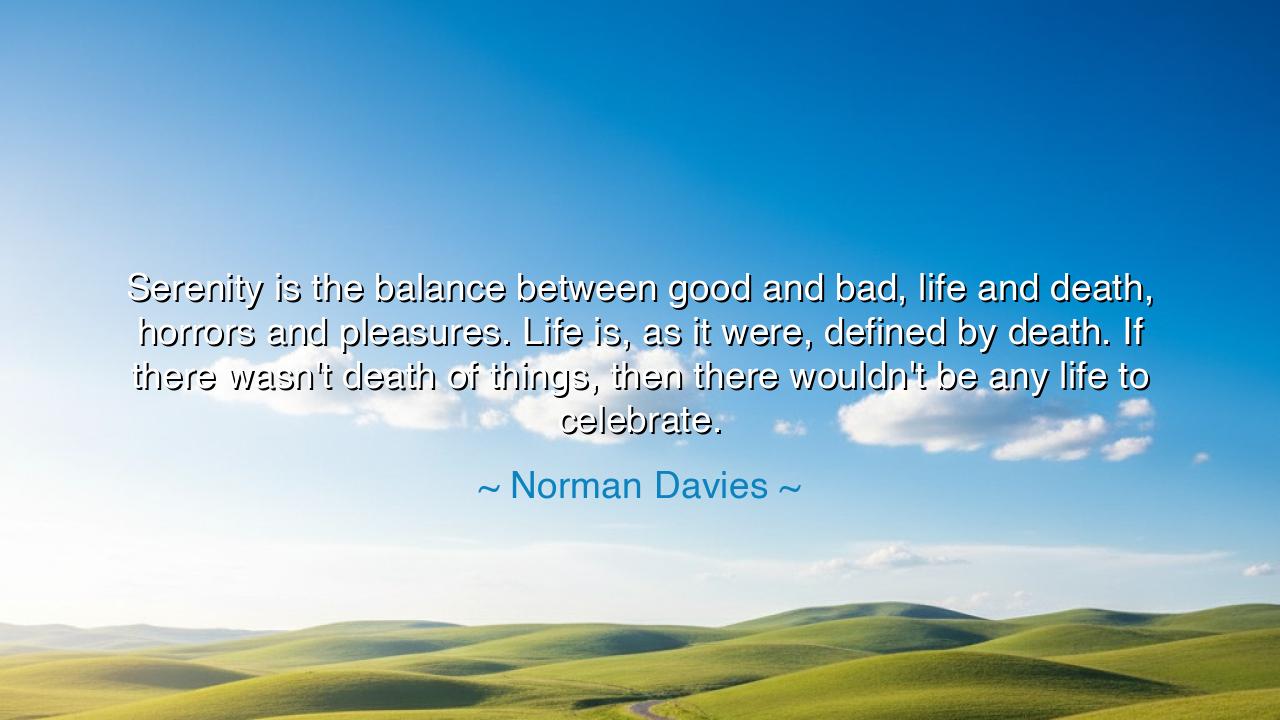
Serenity is the balance between good and bad, life and death
Serenity is the balance between good and bad, life and death, horrors and pleasures. Life is, as it were, defined by death. If there wasn't death of things, then there wouldn't be any life to celebrate.






In the reflective and solemn words of Norman Davies, the historian and philosopher of civilization’s rise and fall, there unfolds a truth as old as time itself: “Serenity is the balance between good and bad, life and death, horrors and pleasures. Life is, as it were, defined by death. If there wasn't death of things, then there wouldn't be any life to celebrate.” These words do not speak of despair, but of understanding — of the eternal balance that governs all creation. Davies reminds us that serenity, that rare and sacred peace of the soul, can only be found in acceptance of duality: that joy is born beside sorrow, that beauty walks hand in hand with decay, and that life itself is illuminated by the shadow of death.
The origin of this quote lies in Davies’ study of history — for he saw, as few others have, the great cycles of civilization: their births, their splendor, and their inevitable decline. Empires rise, gleaming in triumph, and then fall into dust. Nations flourish and fade, heroes are celebrated and forgotten, and yet, through it all, life continues — ever renewed, ever reborn. From this grand tapestry, Davies drew his philosophy: that life has meaning only because it is finite, that all beauty owes its poignancy to its impermanence. His words are a meditation not merely on history, but on the nature of existence itself.
To say that “life is defined by death” is to see with the eyes of wisdom. Without death, there would be no urgency to love, no reason to cherish, no depth to joy. It is the knowledge of mortality that makes every sunrise sacred, every embrace precious, every moment irreplaceable. Death is not the enemy of life, but its boundary — the frame that gives it shape. Just as silence defines music and shadow defines light, so too does death define what it means to live. To seek serenity, then, is not to flee from death, but to embrace the balance it creates, to find peace not in denial, but in understanding.
History itself gives witness to this truth. Consider the story of the Japanese cherry blossom, revered through centuries as a symbol of both beauty and transience. Each spring, the blossoms burst forth in delicate splendor, only to fall within days. Yet it is their brevity that gives them power — because they die, they are cherished all the more. The Japanese word mono no aware captures this feeling — the gentle sadness of impermanence. Norman Davies’ insight flows from this same river of thought: that the fragility of life is what makes it divine. Without endings, beginnings would lose their meaning; without loss, love would lose its fire.
And so he speaks of serenity not as stillness or escape, but as harmony — the soul’s alignment with the rhythm of existence. Serenity is the art of seeing the good within the bad, of finding beauty within suffering, of walking calmly between the two pillars of birth and death. It is the understanding that joy is not the absence of pain, but its counterpart. The ancients knew this truth well. The Taoist sages of China taught that the universe is sustained by the dance of yin and yang, light and dark, each giving life to the other. When one tries to destroy one half of the whole — to chase only pleasure, or to deny death — the harmony collapses. True serenity comes only when we bow before both.
Davies’ wisdom carries a message not of resignation, but of awakening. He reminds us that to live fully, we must stop clinging to permanence. The world changes, bodies age, loved ones depart — but this is not tragedy; it is the natural breath of the universe. To resist it is to suffer endlessly, but to accept it is to be free. The serene soul does not curse the storm; it sails with it. It does not mourn every ending; it gives thanks for having witnessed the story at all. When we learn to see death not as an end, but as the turning of a page, then we begin to live with gratitude instead of fear.
Therefore, my children of time and dust, take this teaching to heart: seek balance, not escape. When joy comes, welcome it with open hands. When sorrow comes, do not shut your heart, for it too has lessons to teach. Remember that every season has its purpose, every loss its meaning, every death its gift. Let the awareness of life’s fragility make you more kind, more mindful, more alive. Live not in denial of death, but in reverence for the fleeting miracle of existence.
For as Norman Davies teaches, serenity is not found in the absence of death or sorrow, but in the acceptance of their place in the great design. To live well, one must learn to die a little each day — to let go, to forgive, to move forward — and in doing so, one learns to celebrate life itself. In the end, the wise do not curse the passing of the blossoms; they thank the wind for carrying them home.






AAdministratorAdministrator
Welcome, honored guests. Please leave a comment, we will respond soon